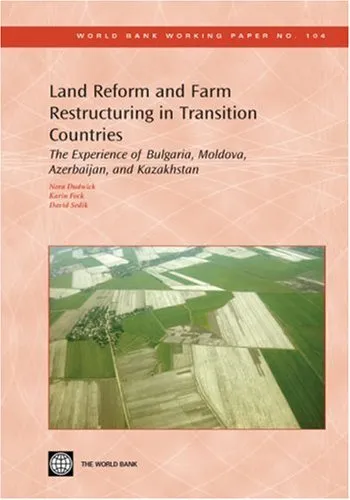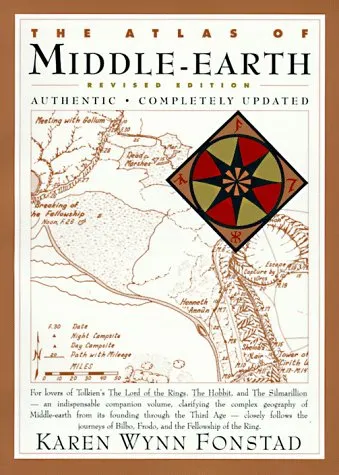Land Reform and Farm Restructuring in Transition Countries: The Experience of Bulgaria, Moldova, Azerbaijan, and Kazakhstan (World Bank Working Papers)
4.3
بر اساس نظر کاربران

شما میتونید سوالاتتون در باره کتاب رو از هوش مصنوعیش بعد از ورود بپرسید
هر دانلود یا پرسش از هوش مصنوعی 2 امتیاز لازم دارد، برای بدست آوردن امتیاز رایگان، به صفحه ی راهنمای امتیازات سر بزنید و یک سری کار ارزشمند انجام بدینکتاب های مرتبط:
مقدمه کتاب
کتاب "Land Reform and Farm Restructuring in Transition Countries" پژوهشی جامع است که به تحلیل و بررسی تجربیات کشورهایی چون بلغارستان، مولداوی، آذربایجان و قزاقستان در حوزه اصلاحات اراضی و ساختاردهی مجدد مزارع میپردازد. این کتاب به عنوان یک سند مرجع در زمینه سیاستهای اصلاحی اراضی و تغییرات ساختاری اقتصادی در کشورهای در حال گذار شناخته میشود.
خلاصهای کامل از کتاب
این کتاب به چالشهای فرایند اصلاحات اراضی در کشورهای در حال گذار میپردازد که عموماً با دشواریهای سیاسی، اجتماعی و اقتصادی مواجه هستند. نویسندگان با تمرکز بر چهار کشور مذکور، تاثیرات سیاستهای اصلاحی در حوزه کشاورزی و ساختاردهی مجدد اراضی را بررسی کرده و نتایج حاصل از این اصلاحات را از دیدگاه اقتصادی و اجتماعی تحلیل میکنند. آنها نه تنها به تحلیل دلایل موفقیتها و شکستها پرداختهاند، بلکه به ارائه راهحلها و توصیههای کاربردی برای بهبود وضعیت کنونی و آینده این کشورها نیز اهتمام داشتهاند.
نکات کلیدی
- اصلاحات اراضی یکی از مهمترین جنبههای انتقال اقتصاد کشورهای پسا-کمونیستی به سوی اقتصاد بازار است.
- شرایط سیاسی خاص و بستر اجتماعی هر کشور بر روند و نتایج این اصلاحات تاثیر عمدهای دارد.
- بانک جهانی نقش مهمی در حمایت از اجرای این اصلاحات در کشورهای مختلف ایفا کرده است.
- تجربیات موفق میتوانند الگویی برای دیگر کشورها باشند که هنوز در این مسیر قرار نگرفتهاند.
جملات معروف از کتاب
"اصلاحات اراضی، نه فقط تغییر در ساختار مالکیت، بلکه تغییری عمیق در شریانهای اقتصادی و اجتماعی یک کشور است."
"تحول در حوزه کشاورزی، نیازی به همکاری فراتر از مرزهای ملی دارد؛ همکاریای که بتواند به تقویت زیرساختهای اقتصادی کمک کند."
اهمیت این کتاب
در جهانی که روند جهانیشدن و تغییرات ساختاری اقتصادی به سرعت در حال وقوع هستند، درک فرآیندها و تجربیات انجامشده در مسیر اصلاحات اراضی میتواند به عنوان یک راهنما برای سیاستگذاران و پژوهشگران در کشورهای مختلف باشد. این کتاب با ارائه تحلیلهای کاربردی و مستند از تجربیات چهار کشور خاص، نه تنها به فهم بهتر از این فرآیندها کمک میکند، بلکه ایدهآلهایی را برای دستیابی به تغییرات پایدار و موثر در عرصههای مختلف اقتصادی و اجتماعی معرفی میکند.
Introduction to Land Reform and Farm Restructuring in Transition Countries
Welcome to an in-depth exploration of the pivotal transformations that have reshaped the agricultural landscapes in Bulgaria, Moldova, Azerbaijan, and Kazakhstan. Land Reform and Farm Restructuring in Transition Countries unravels the complexities of land reform and the restructuring of farms during the significant socio-economic transitions these nations have undergone.
Detailed Summary of the Book
The book offers a comprehensive analysis of land reform policies and their practical implementations within the transitioning economies of Bulgaria, Moldova, Azerbaijan, and Kazakhstan. These countries, each with distinct historical and socio-political backdrops, embarked on a profound journey from state-dominated agricultural systems towards privatized and market-oriented sectors. The study encapsulates various approaches to land redistribution, farm restructuring, and their socio-economic outcomes.
In Bulgaria, the focus is laid on the restitution of land to former owners or their heirs, leading to a mosaic of small, fragmented holdings. Moldova illustrates a stark contrast, highlighting land distributions that emphasize collective organization among private owners. Azerbaijan's journey through post-Soviet transition into land reform is underscored by privatization initiatives and the emergence of family farms. Lastly, Kazakhstan exhibits a hybrid approach where large-scale farming coexists with small privately-held plots.
This work not only evaluates the policy choices and their effectiveness but also provides nuanced insights into the intended and unintended consequences of these reforms, reflecting both successes and challenges along the transition pathways.
Key Takeaways
- Land reform strategies significantly influence agricultural productivity and rural development.
- The complexity of socio-economic and historical contexts requires tailored approaches to reform.
- The transition from state control to privatization is fraught with challenges including legal, institutional, and infrastructural changes.
- Understanding the local dynamics is crucial for effectively implementing land reforms.
- The balance between large-scale and small-scale farming has critical implications for sector sustainability and rural livelihoods.
Famous Quotes from the Book
"The agricultural sector's transformation is not merely an economic phenomenon but a profound social and cultural shift."
"In the heart of land reform lies the delicate balance between equity, efficiency, and historical justice."
Why This Book Matters
This book serves as a crucial resource for policymakers, academics, and students of agricultural economics. It provides invaluable insights into how land reforms can be effectively designed and implemented in transitioning economies. The diversity of approaches and outcomes detailed in this study offers lessons not only for the countries at its focus but also for other nations contemplating similar reforms.
The work of Nora Dudwick, Karin Fock, and David Sedik echoes beyond the mere restructuring of land systems, questioning and probing the deeper societal impacts of such transitions. As global economies continue to evolve, the reflections and analyses herein remain relevant to contemporary debates on sustainable rural development and economic equity.
Ultimately, this book matters because it captures the trials and triumphs of reforming a sector at the core of human livelihood, contributing meaningfully to the discourse on economic transitions and international development.
دانلود رایگان مستقیم
شما میتونید سوالاتتون در باره کتاب رو از هوش مصنوعیش بعد از ورود بپرسید
دسترسی به کتابها از طریق پلتفرمهای قانونی و کتابخانههای عمومی نه تنها از حقوق نویسندگان و ناشران حمایت میکند، بلکه به پایداری فرهنگ کتابخوانی نیز کمک میرساند. پیش از دانلود، لحظهای به بررسی این گزینهها فکر کنید.
این کتاب رو در پلتفرم های دیگه ببینید
WorldCat به شما کمک میکنه تا کتاب ها رو در کتابخانه های سراسر دنیا پیدا کنید
امتیازها، نظرات تخصصی و صحبت ها درباره کتاب را در Goodreads ببینید
کتابهای کمیاب یا دست دوم را در AbeBooks پیدا کنید و بخرید
1373
بازدید4.3
امتیاز0
نظر98%
رضایتنظرات:
4.3
بر اساس 0 نظر کاربران
Questions & Answers
Ask questions about this book or help others by answering
No questions yet. Be the first to ask!
















